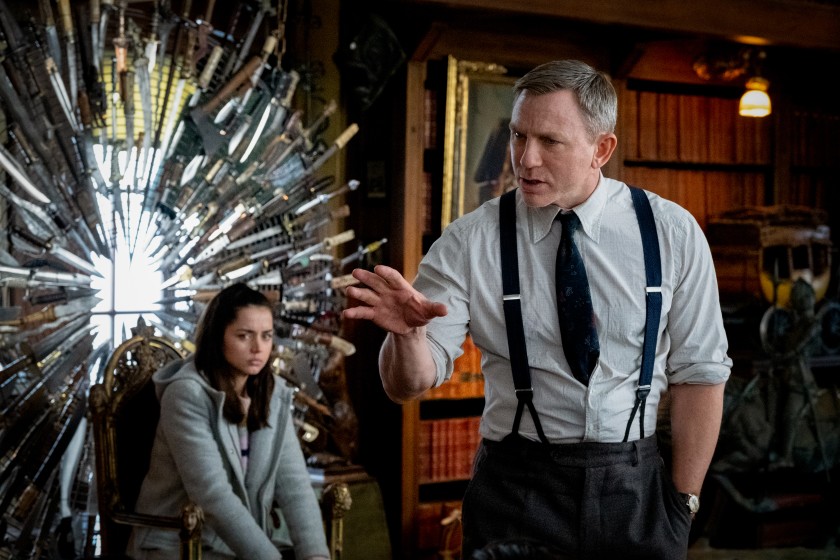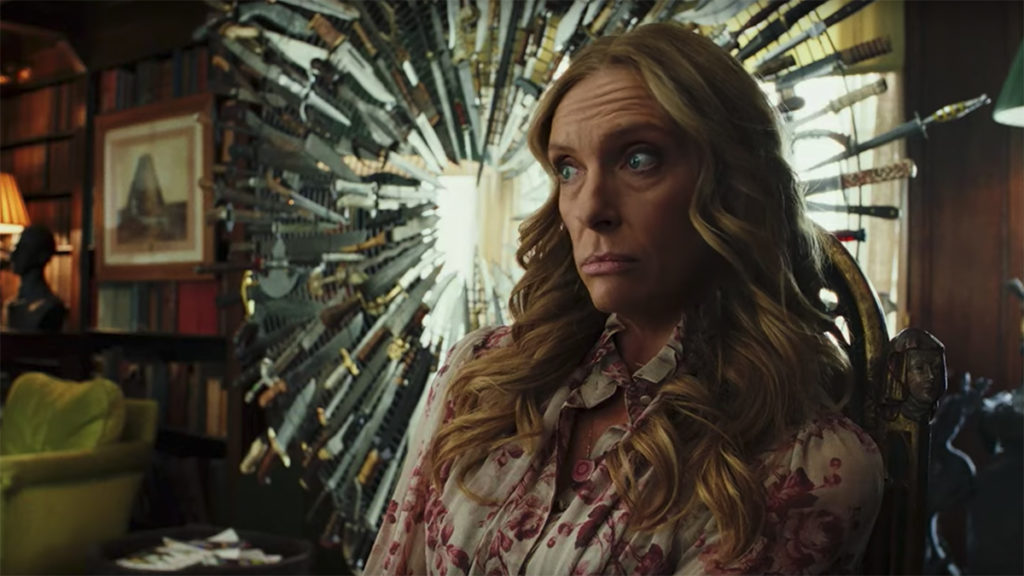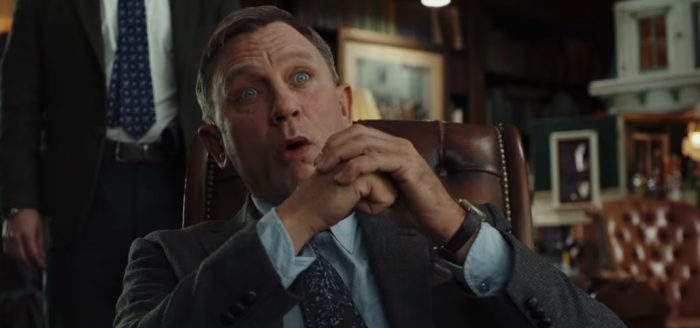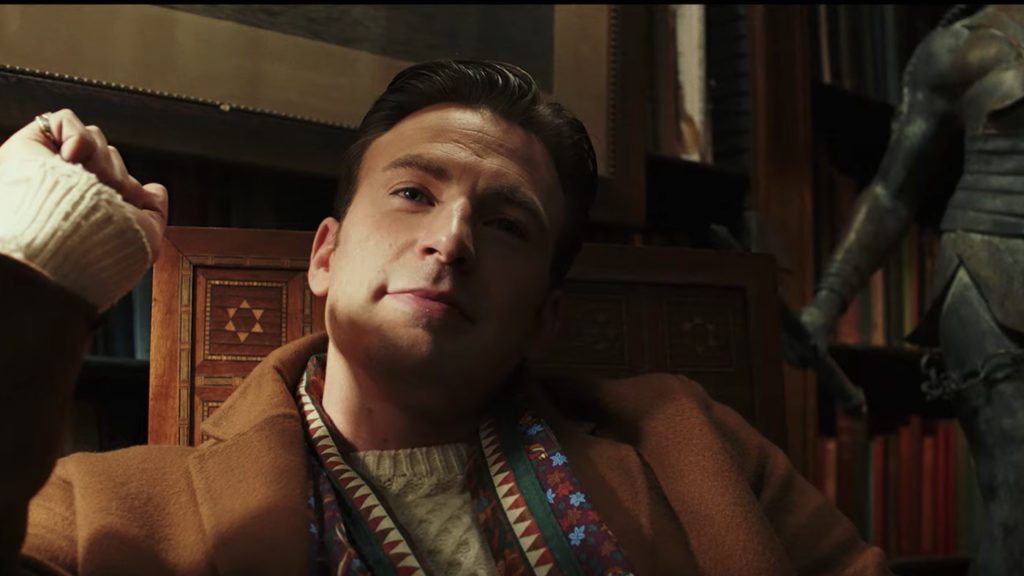
There are a great many significant clues in Knives Out—a pair of blood-spattered sneakers, a set of muddy footprints, a deadly syringe—but what may be its most meaningful artifact has little to do with its labyrinthine plot. I’m speaking of the Panasonic pop-up VCR, the ancient device whose grainy security footage may hold critical information, if the investigators can just extract the damn tape from the machine. A relic from an earlier era when Betamax was still a contender and consumers had to select between EP and SP, the Panasonic’s presence would seem to brand this film as a throwback, a nostalgic hymn to cinema’s halcyon days, when mid-budget studio productions ruled the day and superheroes were relegated to the pages of the comic book.
To be sure, Knives Out is laden with analog pleasures: sudden rack focuses; portentous musical cues; dizzying flashbacks; Chris Evans in knitted sweaters. (OK, that last one might not be old-fashioned, but its appeal is certainly timeless.) Yet it would be a mistake to pigeonhole this bracing new movie, which was written and directed with vigor and wit by Rian Johnson, as an homage to the pictures of yesteryear or as a critique of the contemporary multiplex. Knives Out is too energetic, too entertaining, too celebratory—too much damn fun—to be scolding. And while it may carry a certain classical sensibility, it is also distinctly modern, with an impish tone that couldn’t possibly be deemed traditional. They say they don’t make ’em like they used to, but I’m not sure they ever made them quite like this.
Not that the template of Knives Out is revolutionary. It’s a pure whodunit, with the “it” being Harlan Thrombey (Christopher Plummer), a fearsomely successful mystery novelist who’s found dead the morning after his 85th birthday party. Forensic analysis suggests that he committed suicide, but we know better, even if the lead detective, Lieutenant Elliott (LaKeith Stanfield), isn’t initially inclined to probe too deeply. Still, he dutifully assembles the various party guests for interviews, including (deep breath): Harlan’s daughter, Linda (Jamie Lee Curtis), who runs a thriving real estate firm; her husband, Richard (Don Johnson), the kind of jerk who’s fond of spouting Trumpian politics during Thanksgiving; their son, the fabulously named Ransom (Evans), whose life of privilege has afforded him considerable comfort and minimal courtesy; Harlan’s son, Walt (Michael Shannon), who manages the Thrombey publishing company; Harlan’s daughter-in-law, Joni (Toni Collette), who possesses a more playful persona as compared to the stiff Thrombey bloodline; and Joni’s daughter, Meg (13 Reasons Why’s Katherine Langford), a prep-school student who often spars with Walt’s teenage son, Jacob (It’s Jaeden Martell), who is described by some as “politically active” and others as “literally a Nazi”.

Got all that? It’s a crowded clan, but Johnson introduces his players briskly and efficiently, cutting between the various interviews with purpose and élan. The uniformly strong cast helps highlight the characters’ key traits, which allows Johnson to quickly plant seeds of suspicion that are all but guaranteed to give birth to red herrings. Everyone loved Harlan dearly; everyone also had a motive for wanting him dead. The bereaved double as unreliable narrators, and their testimony only raises troubling questions. Was Richard having an affair? Was Walt feuding with Harlan over his refusal to license his books to Netflix? Was Joni skimming from Harlan’s bank account? Was Harlan writing his progeny out of his will? And who is that sharply dressed guy in the back who keeps randomly plinking piano keys whenever an interviewee says something that accounts for less than the whole truth?
That guy, happily, is Benoit Blanc (seriously, Johnson is so good at naming characters), a renowned private investigator armed with a keen intellect, a mistrustful mindset, and a ridiculous Southern accent which one character describes as a bastardized Foghorn Leghorn. Blanc is played, in a performance of glorious showboating, by Daniel Craig, who slides into the detective’s tweed suits so effortlessly, you scarcely remember he became famous for portraying a tuxedoed action hero. (You may recall, however, his work as a West Virginia safe-cracker in Logan Lucky; between that film and this one, Americans might want to petition to prevent the Briton from ever returning to his native soil.) In literary terms, his obvious comparator is Hercule Poirot, but Blanc doesn’t flaunt his intelligence; to the contrary, Craig plays him as almost deferential, an unusually polite savant who’s terribly sorry that his job requires him to hunt for the truth. But hunt he does, and his genial doggedness makes him both an ally and a danger to the movie’s true hero, who isn’t a member of the Thrombey family at all.
That would instead be Marta (Blade Runner 2049’s Ana de Armas), Harlan’s long-time nurse, board-game competitor, and friend. Marta suffers from a bizarre affliction which is both the film’s greatest contrivance and one of its most brilliant complications: Whenever she tells a lie, she vomits, like a gastrointestinal Pinocchio. This makes her a natural assistant to Blanc, who relies on her candor as he attempts to unravel the web of deception that the various Thrombeys have spun. It also results in a particular challenge for Marta, who, despite her physical reaction to dishonesty, knows more about Harlan’s death than she lets on.

It’s tricky to write about Knives Out without divulging some of its most startling revelations, partly because Johnson—in an absolute masterstroke of screenwriting bravura—unveils the identity of the killer roughly half an hour into the movie. That bold maneuver neutralizes the issue of diminishing returns that poisons most whodunits, which tend to start out with intrigue, only to fizzle once you realize that the whole thing is a pointless guessing game. Here, instead of inciting random speculation, Knives Out derives its suspense from Marta’s thorny predicament. She has her own mystery to solve—and to be sure, Johnson keeps springing plenty of surprises after that initial reveal—but she’s also required to (at times literally) cover her tracks. This results in a tantalizing asymmetry in her relationship with Blanc—he insists on helping her but is, at the same time, unwittingly drawing closer to exposing her—which lends the film a unique and thrilling form of tension.
Part of the fun of Knives Out is the way your mind races to keep up with its twists, but there are also more immediate charms on display. The movie may not be as grandly eye-catching as Johnson’s contribution to the Star Wars universe, The Last Jedi, but it nevertheless possesses its own small-scale allure. The production design is a hoot, as the Thrombey house is filled with mystery-accented accoutrements: creaky staircases, hidden windows, secret passageways. Even the prosaic interview scenes unfold in front of a charged backdrop, with the witnesses seated in front of an ominous circular structure that’s outfitted with countless glittering blades.
And while it wouldn’t be quite accurate to deem Johnson a writer first and foremost—years before The Last Jedi, Looper established his aesthetic bona fides—he remains ferociously gifted with the pen. As with Brick, his mesmerizing debut feature, Knives Out’s overarching narrative is deliriously elaborate, but it’s the scene-to-scene dialogue that really sizzles. Johnson’s words help to instantly define his characters; whereas Linda tells Blanc that she read a New Yorker article about him, Joni hilariously declares, “I read a tweet about a New Yorker article about you.” Johnson can also supply juicy monologues, as when Blanc waxes rhapsodic about a pretentious novel called “Gravity’s Rainbow”. And he doesn’t discriminate; he recognizes the power of a simple “Eat shit”, especially when juxtaposed against the colorful accusation that someone was “joylessly masturbating to photos of dead deer”.

There are a few pockets of Knives Out that don’t quite rise to its level of overall mastery. A car chase, which one character describes as “the dumbest car chase in history”, is, well, pretty dumb. And the climax includes one of those obvious scenes where a confession is being discreetly recorded; it’s also faintly exhausting to keep up with Blanc as he finally clicks all of the puzzle pieces into place. But answering the riddle is not Johnson’s only concern, even if he does so with unmistakable flair. He also smuggles into the movie a political argument that is striking in its bluntness and surprising in its force.
Marta, you see, is plainly not an honorary member of the Thrombey family, no matter how many times they assure her otherwise. Her lesser station is mostly played for comic effect, and winningly so; for example, each Thrombey is convinced that she emigrated from a different South American country. They also all wanted her to be allowed to attend Harlan’s funeral; sadly, they were all outvoted.
It’s funny! But it also pokes at an illuminating point about how moneyed Americans treat immigrants—how they’re always supportive of their inferiors, provided they remember their social and economic place. (For a more aggressive satire of the entitlement of the aristocracy, see Ready or Not.) De Armas is a sympathetic presence, which is crucial; Marta is smart and perceptive, sure, but as she navigates the film’s hairpin turns, her most valuable quality proves to be her decency. It’s a feature shared by Blanc, whose passion for his craft arises not from some sort of academic desire to decipher the mystery, but from the far nobler goal of rectifying injustice.
Marta may be willing to sacrifice, but have no fear; appreciating this exhilarating film requires you to surrender nothing, except perhaps the foolish idea that movies are no longer what they once were. At one point, Lieutenant Elliott posits that the Thrombey mansion looks like the board from Clue, so in that spirit, I would like to announce that I have solved the crime. It was Director Johnson, with the ingenuity, in the multiplex. But whom did he kill? Not a person. No, it was the fallacy itself—the pernicious notion that cinema is dying—that was savagely, joyously murdered.
Grade: A-
Jeremy Beck is the editor-in-chief of MovieManifesto. He watches more movies and television than he probably should.
